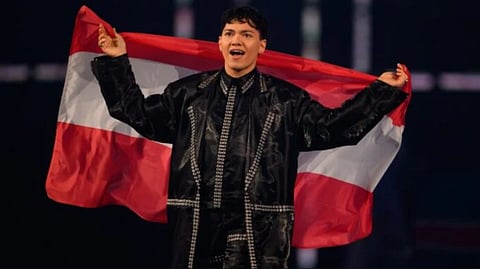
- LIFESTYLE
- FASHION
- FOOD
- ENTERTAINMENT
- EVENTS
- CULTURE
- VIDEOS
- WEB STORIES
- GALLERIES
- GADGETS
- CAR & BIKE
- SOCIETY
- TRAVEL
- NORTH EAST
- INDULGE CONNECT

Johannes Pietsch, an Austrian singer trained in classical music, won the 69th Eurovision Song Contest held in Switzerland on Saturday with his song "Wasted Love," which combines operatic, multi-octave vocals with a techno influence. Israeli musician Yuval Raphael finished in second place.
JJ secured Eurovision's victory for the third time and for the first time since 2014, when the bearded drag queen Conchita Wurst won. The Vienna State Opera singer, aged 24 and a countertenor, has called Wurst a mentor. After accepting the glass Eurovision trophy shaped like a microphone, he exclaimed, “This is beyond my wildest dreams. It’s crazy."
In a dramatic final, Raphael's popular vote, driven by her large fanbase, was for her catchy song "New Day Will Rise." Nonetheless, JJ was declared the winner. He also faced objections from pro-Palestinian protesters who demanded Israel be disqualified from the contest due to its actions during the war against Hamas in Gaza.
In a post-victory news conference, JJ explained that his song about failed love aimed to communicate that “love is the strongest force on planet Earth, and love persevered.”
He added, “Let's spread love, guys,” and expressed his excitement about being the first Eurovision winner with Filipino roots and openly gay. His message, he said, was about “equality and acceptance for everyone.”
Austria, which will host the contest next year, congratulated JJ on his success.
“What a great success - my warmest congratulations on winning #ESC2025! JJ is writing Austrian music history today!” stated Chancellor Christian Stocker on X.
According to the official Eurovision website, the winning country will receive a handcrafted glass microphone trophy, "custom designed" for the event.
The trophy is made from "solid transparent glass with sand-blasted and painted detailing." The website also mentions that smaller versions of the Eurovision trophy will be awarded to the songwriters and composers of the song performed by the contest winner.
The European Broadcasting Union (EBU), which oversees Eurovision, strengthened the contest’s code of conduct this year, urging participants to uphold Eurovision’s core values of “universality, diversity, equality and inclusivity” as well as its political neutrality.
Following a controversial ban in 2024 that prohibited waving flags other than national ones in the arena, this year audience members are allowed to bring Palestinian flags or any other flags, provided they comply with Swiss law. However, performers are only permitted to wave their own country’s flag.
Eurovision director Martin Green explained to reporters that the organizers aimed to “re-establish a sense of unity, calm and togetherness this year in a difficult world.”
“All 37 delegations, in difficult times, have behaved impeccably,” he added.